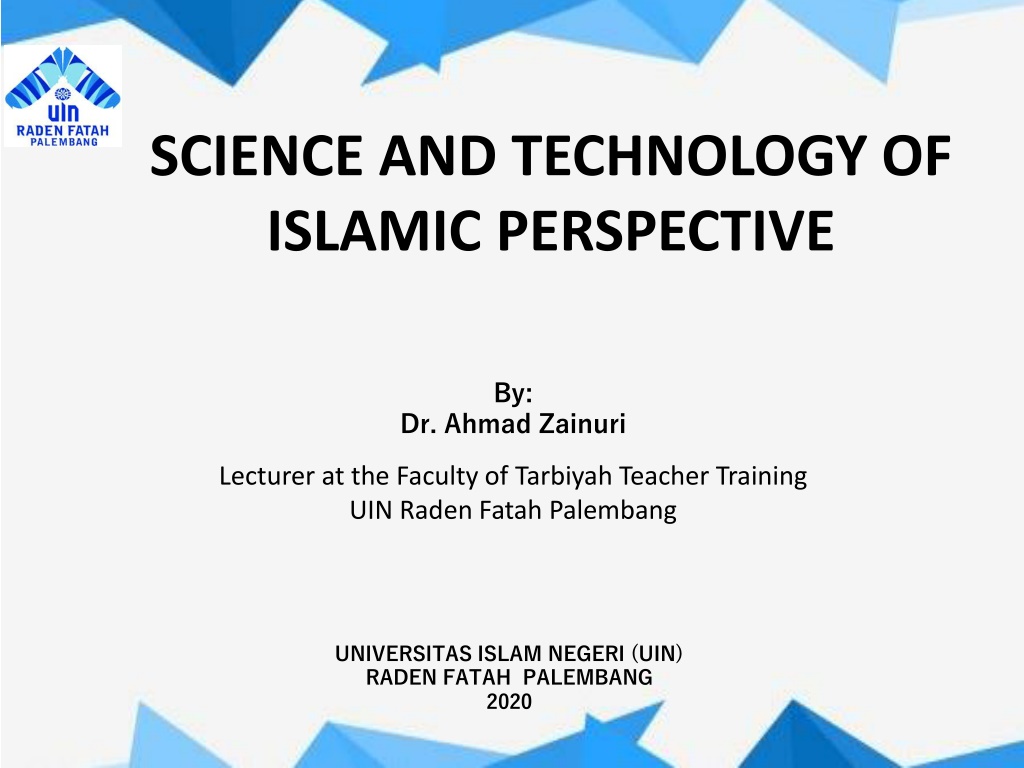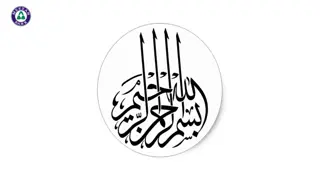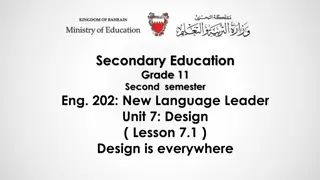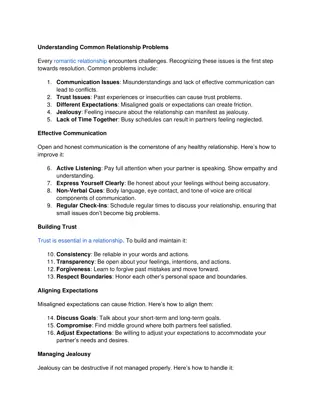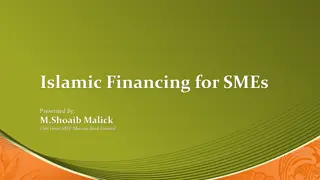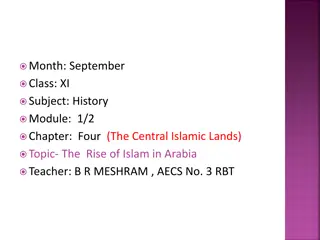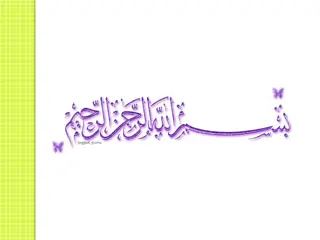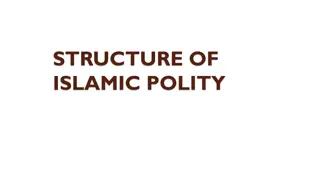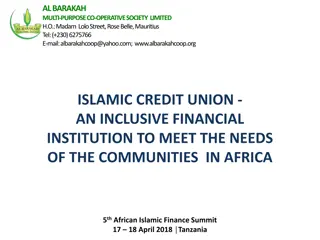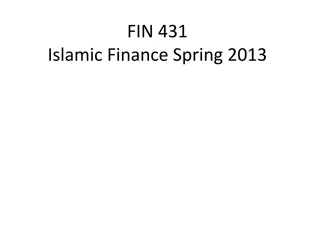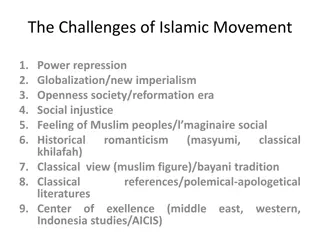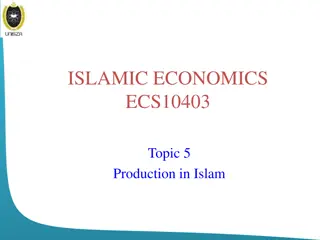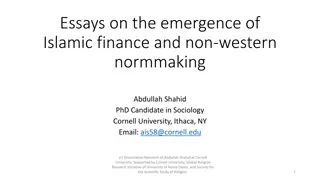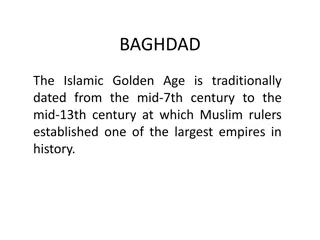Perspectives on Integrating Islamic Science and Modern Science
The dichotomy debate between modern science and Islamic science is a crucial issue among Muslim scholars, with efforts being made to integrate the two through concepts like Islamization of science. Scholars like Al-Attas and Al-Faruqi emphasize the need to reconcile Western influences while preserving Islamic principles. Additionally, Imam al-Ghazali's insights on the holistic nature of human existence further illuminate this discussion.
Download Presentation

Please find below an Image/Link to download the presentation.
The content on the website is provided AS IS for your information and personal use only. It may not be sold, licensed, or shared on other websites without obtaining consent from the author. Download presentation by click this link. If you encounter any issues during the download, it is possible that the publisher has removed the file from their server.
E N D
Presentation Transcript
SCIENCE AND TECHNOLOGY OF ISLAMIC PERSPECTIVE By: Dr. Ahmad Zainuri Lecturer at the Faculty of Tarbiyah Teacher Training UIN Raden Fatah Palembang UNIVERSITAS ISLAM NEGERI (UIN) RADEN FATAHPALEMBANG 2020
The dichotomy debate (modern science and Islamic science) is still a crucial problem among Muslim scholars. Islamic science is understood as science based on revelation, the hadith of the Prophet and the ijtihad Meanwhile, modern science is a science-based on experimentation and human reasoning, based on empirical data through sciences have their respective areas separate from one another, both in terms of formal- material objects, research methods, criteria for truth, and the roles they play. of the scholars. PRELIMINARY research. The two
There are ideas among Muslim scientists to integrate the two sciences through the Islamization of science or the integration of PRELIMINARY science to neutralize modern Western science's influence. This idea was initiated by Syed Muhammad Naquib al-Attas and Isma'il Raj'i al-Faruqi.
1. Al-Attas. The knowledge that has spread to the middle of the world community, including the Islamic community, has been colored by Western cultural and civilization features. Meanwhile, Western civilization itself has given rise to confusion. Civilization born from Western knowledge has lost its essence, causing chaos in human life. Therefore al-Attas views that Western civilization is not suitable for consumption before being selected and sorted, the true from the mixed with falsehood. PRELIMINARY 2. Al-Faruqi. The Islamization of knowledge must observe a number of principles which are the essence of Islam. To regain discipline under the framework of Islam means making theories, methods, principles and goals that are subject to the oneness of Allah, the unity of the universe, the unity of truth and knowledge, the unity of life and the unity of mankind. According to al-Faruqi, Western civilization and westernization have had negative effects on Muslims. On the one hand, Muslims have become acquainted with modern Western civilization, but on the other hand they have lost their solid ground, namely a way of life that is rooted in religious morals.
Imam al-Ghazali, in the book Jawahir al-Qur'an and Ihya 'Ulm al-Din, said that the concept of man according to the Qur'an is composed of material and immaterial elements or physical and spiritual. However, he emphasized the meaning and nature of human events in his spiritual or soul. Nature and Human Potential
M. Yasir Nasution's research on the concept of man according to al-Ghazali, concluded; "The essence of man is a soul called al- qalb, al-ruh, al-nafs, and al-'aql, namely immaterial substances that stand alone, originating from the realm of al-amr, have no place, have the ability to know and to move, has the nature of being eternal and created (not qadim)". Nature and Human Potential
But in another opinion, Ali Issa Othman said Ghazali's view, the thing that distinguishes other creatures is the nature of their spirits, which are equated with humans' essence. that in al- Nature and Human Potential humans from
Humans have various potentials, including tawhid (religious fitrah), reason, heart (qalb), and body. Apart from this positive potential, there is also a negative potential in humans, which weakness, such as the potential to fall into the temptation of lust and demons. Therefore, humans are said to be paradoxical creatures. That is, they tend toward both good and bad. Nature and Human Potential is a human
The paradigm is value-free Modern born and developed in the context of specific values, civilizations The philosophical Modern Science-technology is the ideology of liberalism-capitalism and secular-materialistic materialism modern science-technology science-technologies are PARADIGM OF SCIENCE - MODERN TECHNOLOGY paradigms and paradigm of
al-Qur'an and hadith are the grand theories for modern science-technology. The principle of integration of modern science- technology in Islamic teachings should be following the concept of human nature as the subject and object of Islamic education as the noblest and best creatures of Allah who have been equipped with a set of potentials. Humans have various potentials, (religious fitrah), reason, heart (qalb), and body. Science-Technology and Islamic Education:The importance of scientific paradigm integration including tawhid Islamic education's primary objective must be in line to create humans as the caliph of Allah SWT on earth to carry out Allah's laws legally and prosper the universe. Bring forth humans who do not have a split personality in society
1. In essence, humans are formed from a series of two substances, namely, the material component (the body that comes from the heart of the earth), and the immaterial component (the spirit that Allah SWT "blew"). The essence of man is the spirit as he is himself. Humans have been equipped with a set of potentials, namely, the potential of tauhid (religious fitrah), mind, heart (qalb), and body. Apart from this positive potential, there is also a negative potential in humans, which is a human weakness, such as the potential to fall into the temptation of lust and demons. Therefore, humans are said to be paradoxical creatures. That is, they have a tendency towards direction and evil at the same time. Conclusion 2. The goal of a human being is to become the caliph of Allah SWT on earth. To be in line with the created goals, the concept of modern science-technology is not dichotomized so that humans do not have split personalities in society. Realizing this truth, it is necessary to integrate modern science-technology with Islamic teaching values.
